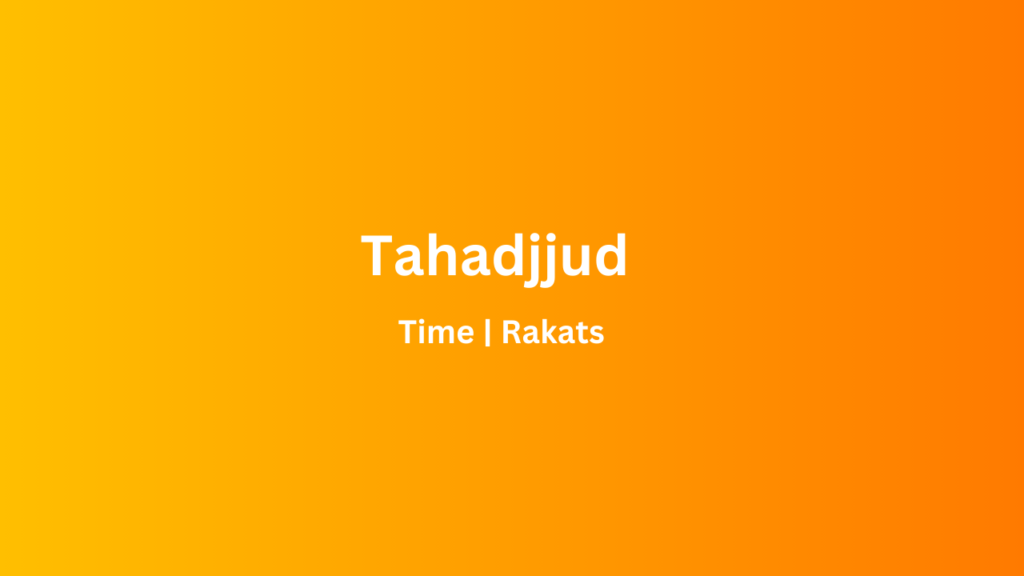The Blessings of Tahajjud | Best Time | Rakat |Tahajjud 2023
Introduction to Tahajjud
Tahajjud time is a special time of the night that holds great significance in Islamic tradition. It is a voluntary prayer that is performed after midnight and before the dawn prayer (Fajr). The word “tahajjud” comes from the Arabic root word “hajada,” which means to stay awake or to spend the night in prayer.
How long does Tahajjud prayer last?
The duration of Tahajjud prayer depends on the number of rak’ahs a person decides to perform. It can range from a few minutes to several hours.
Can Tahajjud prayer be performed in congregation?
Tahajjud prayer can be performed individually or in congregation. However, it is more commonly performed individually as it is a voluntary act of worship.
Can Tahajjud prayer replace missed obligatory prayers?
No, Tahajjud prayer cannot replace missed obligatory prayers. Obligatory prayers have their specific times and cannot be made up through voluntary prayers.
How should one prepare for Tahajjud prayer?
One should prepare for Tahajjud prayer by performing wudu (ablution), choosing a quiet and clean place to pray, and reciting the supplications recommended for Tahajjud prayer.
Can one perform Tahajjud prayer without sleeping?
Yes, one can perform Tahajjud prayer without sleeping. The primary requirement for Tahajjud prayer is that it is performed after midnight and before the dawn prayer (Fajr).
How often should one perform Tahajjud prayer?
There is no set frequency for performing Tahajjud prayer. It is a voluntary act of worship that a person can perform whenever they wish to seek Allah’s forgiveness, blessings, and guidance.

Tahajjud Time in different countries
Tahajjud time refers to a special time of the night that holds great significance in Islamic tradition. It is a time when Muslims voluntarily perform Tahajjud prayer, which is a form of voluntary worship. This article aims to shed light on Tahajjud time, its importance, and the benefits of performing Tahajjud prayer.
As Tahajjud time is determined by the time of Fajr prayer, it varies depending on the location and season. Here are the approximate timings of Tahajjud prayer in different countries:
- United States: Tahajjud time in the US varies based on the location and season. For example, in New York City, Tahajjud time is approximately between 2:30 AM to 4:30 AM.
- United Kingdom: In London, Tahajjud time is approximately between 2:30 AM to 4:30 AM.
- Saudi Arabia: In Riyadh, Tahajjud time is approximately between 3:00 AM to 4:30 AM.
- United Arab Emirates: In Dubai, Tahajjud time is approximately between 3:00 AM to 4:30 AM.
- Pakistan: In Karachi, Tahajjud time is approximately between 2:30 AM to 5:00 AM.
- India: In New Delhi, Tahajjud time is approximately between 2:00 AM to 5:30 AM.
It’s important to note that these timings are approximate and may vary based on the location and season. Muslims can consult their local mosque or Islamic center to determine the exact timings of Tahajjud prayer in their area.
What is Tahajjud Time?
Tahajjud time refers to a specific time of the night when Muslims perform Tahajjud prayer. It is a voluntary act of worship that holds great significance in Islamic tradition.
What is Tahajjud prayer?
Tahajjud prayer is a voluntary prayer that a person performs during Tahajjud time. It is a form of worship that involves seeking Allah’s forgiveness, blessings, and guidance.
When is Tahajjud prayer performed?
Tahajjud prayer is performed after midnight and before the dawn prayer (Fajr). The exact timing of Tahajjud varies depending on the location and season, as it is determined by the time of Fajr prayer.
Is Tahajjud prayer compulsory?
No, Tahajjud prayer is not compulsory in Islam. It is a voluntary act of worship that a person can perform to seek Allah’s forgiveness and blessings.
What are the benefits of performing Tahajjud prayer?
Performing Tahajjud prayer has numerous spiritual benefits, including seeking forgiveness, purifying the soul, increasing faith and devotion to Allah, and seeking His blessings and guidance in this life and the hereafter.
What acts of worship can be performed during Tahajjud prayer?
During Tahajjud prayer, a person can recite any portion of the Quran, perform extra rak’ahs (units of prayer), make dua (supplication), and engage in other acts of worship.
Did the Prophet Muhammad (peace be upon him) perform Tahajjud prayer?
Yes, the Prophet Muhammad (peace be upon him) used to perform Tahajjud prayer regularly and encouraged his companions to do the same.
The method of performing Tahajjud prayer
The method of performing Tahajjud prayer is as follows:
- Wake up during the last third of the night, just before the Fajr prayer.
- Perform Wudu (ablution) as you would for any other prayer.
- Begin Tahajjud prayer with two rak’ahs (cycles of prayer) and then perform as many additional rak’ahs as you wish.
- During each rak’ah, recite Surah Al-Fatihah and any other Surah from the Quran.
- After completing the desired number of rak’ahs, offer two rak’ahs of Witr prayer.
- In the last rak’ah, recite the supplication of Qunut.
- Finally, end the prayer with the Taslim by turning the head to the right and saying “Assalamu alaikum wa rahmatullah” and then turning the head to the left and repeating the same phrase.
It’s important to note that there is no specific method of performing Tahajjud prayer. It is a voluntary act of worship, and a person can perform it in whichever way they feel comfortable. The important thing is to perform it with sincerity and devotion, seeking Allah’s forgiveness and blessings.
Read : Taharat-o-Namaz ka SUNNAT Tarika | Saheh Ahkam-o-Masal
The Significance of Tahajjud Prayer in Islamic Tradition:
Tahajjud prayer is considered an act of great virtue and reward in Islamic tradition. It is a voluntary prayer that a person performs to seek Allah’s forgiveness, blessings, and guidance. The Quran emphasizes the importance of Tahajjud prayer and its potential to elevate one’s spiritual status.
In the Quran, Allah mentions the importance of the tahajjud prayer in Surah Al-Isra, Verse 79: “And during a part of the night, pray Tahajjud beyond what is incumbent on you; maybe your Lord will raise you to a position of great glory.” This verse highlights the importance of tahajjud prayer and its potential to elevate one’s spiritual status.
The Meaning and Etymology of Tahajjud
The word “Tahajjud” comes from the Arabic root word “hajada,” which means to stay awake or to spend the night in prayer. The linguistic roots of the word indicate that Tahajjud is a prayer that a person performs during the night when most people are asleep.
Tahajjud prayer is also known as the “night prayer,” as it is typically performed during the darkest part of the night when most people are asleep. The exact time of tahajjud varies depending on the location and season, as it is determined by the time of Fajr prayer. Generally, it is performed between midnight and the time of the Fajr prayer.
The Time of Tahajjud Prayer:
Tahajjud prayer is performed after midnight and before the dawn prayer (Fajr). The exact timing of Tahajjud varies depending on the location and season, as it is determined by the time of Fajr prayer. Generally, it is performed between midnight and the time of the Fajr prayer.
Ahades About Tahajjud
During tahajjud prayer, a person can recite any portion of the Quran, perform extra rak’ahs (units of prayer), make dua (supplication), and engage in other acts of worship. The Prophet Muhammad (peace be upon him) used to perform tahajjud regularly and encouraged his companions to do the same. He said, “The best prayer after the obligatory prayers is the night prayer” (Sahih Muslim).
The Voluntary Nature of Tahajjud Prayer:
Performing Tahajjud prayer is a voluntary act of worship in Islam. It is not compulsory, but it is considered an act of great virtue and reward. It is a time when a person can connect with Allah on a deeper level, seeking His forgiveness and blessings.
The Prophet Muhammad’s (PBUH) Emphasis on Tahajjud Prayer:
The Prophet Muhammad (peace be upon him) used to perform Tahajjud prayer regularly and encouraged his companions to do the same. He said that the best prayer after the obligatory prayers is the night prayer. His emphasis on Tahajjud prayer highlights its importance in Islamic tradition.
The Benefits of Performing Tahajjud Prayer:
Performing Tahajjud prayer has numerous spiritual benefits. It is an opportunity to seek forgiveness, purify the soul, and increase one’s faith and devotion to Allah. It is also a time when one can ask for blessings and guidance in this life and the hereafter. It is an act of worship that can bring one closer to Allah and provide protection from the trials and tribulations of this world.
The Acts of Worship Performed During Tahajjud Prayer:
During Tahajjud prayer, a person can recite any portion of the Quran, perform extra rak’ahs (units of prayer), make dua (supplication), and engage in other acts of worship. It is a time when one can connect with Allah on a deeper level and seek His forgiveness and blessings.
Conclusion: The Importance of Tahajjud Prayer in Strengthening One’s Relationship with Allah:
In conclusion, Tahajjud time is a special time of the night that holds great importance in Islamic tradition. Performing Tahajjud prayer is a highly recommended act of worship that provides numerous spiritual benefits. It is a time when one can connect with Allah on a deeper level, seeking His forgiveness and blessings. Tahajjud prayer can elevate one’s spiritual status and bring one closer to Allah, strengthening one’s relationship with Him.
Faqs
Can women perform Tahajjud prayer?
Yes, women can perform Tahajjud prayer just like men. There are no gender-specific restrictions on this voluntary act of worship.
Can one perform Tahajjud prayer in Ramadan?
Yes, performing Tahajjud prayer is highly recommended during Ramadan. Muslims often increase their acts of worship during Ramadan, and Tahajjud prayer is a great way to seek Allah’s blessings and forgiveness during this holy month.
How many rak’ahs should one perform during Tahajjud prayer?
There is no specific number of rak’ahs that a person must perform during Tahajjud prayer. It is a voluntary act of worship, and a person can perform as many rak’ahs as they wish, with two rak’ahs being the minimum.
Can Tahajjud prayer be combined with other prayers?
No, Tahajjud prayer cannot be combined with other prayers. Each prayer has its specific time and must be performed individually.
Can one perform Tahajjud prayer after Fajr prayer?
No, Tahajjud prayer cannot be performed after Fajr prayer. It must be performed after midnight and before the Fajr prayer.
What is the best time to perform Tahajjud prayer?
The best time to perform Tahajjud prayer is during the last third of the night, just before the Fajr prayer. This is the time when Allah descends to the lowest heaven and grants forgiveness to those who seek it.
Is it necessary to wake up for Tahajjud prayer?
No, it is not necessary to wake up specifically for Tahajjud prayer. If a person is awake during the last third of the night, they can perform Tahajjud prayer. However, waking up specifically for Tahajjud prayer shows a person’s dedication and devotion to seeking Allah’s forgiveness and blessings.
